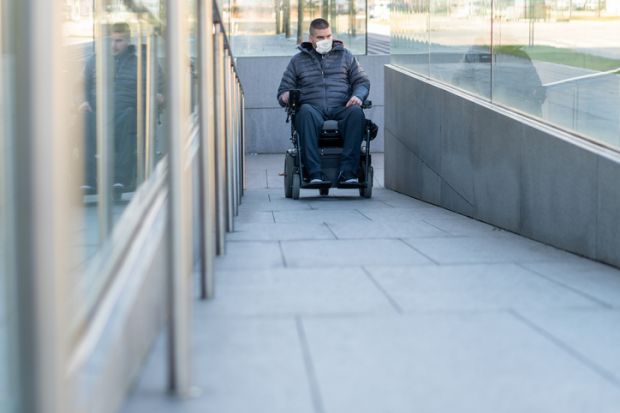UK students with disabilities were more likely to delay the start of their degree during the pandemic than other applicants, according to new analysis.
In a study, published on 30 June, that suggests the prospect of online learning may have deterred disabled students from entering higher education for at least a year, Ucas found the deferral rate for disabled applicants rose from the pre-pandemic 7 per cent in 2019 to 8.2 per cent in 2021.
That rate was significantly higher than the 6.4 per cent deferral rate for non-disabled applicants in 2021.
That differential was even greater for those with certain conditions, with students on the autism spectrum 11 per cent more likely to defer than non-disabled students.
Overall, the study produced with Pearson found that there were 83,220 UK applicants who shared an impairment, condition or mental-health condition in their Ucas application in 2021, and almost 67,000 were accepted onto a higher education course, with the number of students sharing an impairment double what it was 10 years ago.
Almost 30,000 people registered a learning difficulty in 2021, up from about 22,000 in 2012, while 24,000 informed Ucas about a mental-health condition, compared with just 4,000 in 2012.
Based on a survey of 5,000 applicants, about half (49 per cent) said they felt very or mostly supported by the general and pastoral support they had received, while 53 per cent said they felt supported by the educational support they had received.
Clare Marchant, chief executive of Ucas, said it was important for applicants to declare information about any disability, even if it was voluntary, as it would “flag up early any important conversations they may wish to have about their needs with their university or college choices”.
On the higher rate of deferrals among students with disabilities, Ms Marchant added that a “key takeaway from our research is that students need earlier support to avoid deferring”.
“We are recommending the extension of adjustment passports, which currently only cover the transition from higher education into employment, to make it easier for students to progress to university, college or an apprenticeship, meaning more students can take that next step along with their peers,” she said.
Geoff Layer, chair of the Disabled Students’ Commission, said the report “provides a rich analysis of the accessibility of higher education for disabled students and most importantly it differentiates on the basis of the barriers that students face”.
“[It] adds further weight to our arguments that we as a sector need to reflect on some of our approaches,” said Professor Layer, former vice-chancellor of the University of Wolverhampton.
Register to continue
Why register?
- Registration is free and only takes a moment
- Once registered, you can read 3 articles a month
- Sign up for our newsletter
Subscribe
Or subscribe for unlimited access to:
- Unlimited access to news, views, insights & reviews
- Digital editions
- Digital access to THE’s university and college rankings analysis
Already registered or a current subscriber? Login








